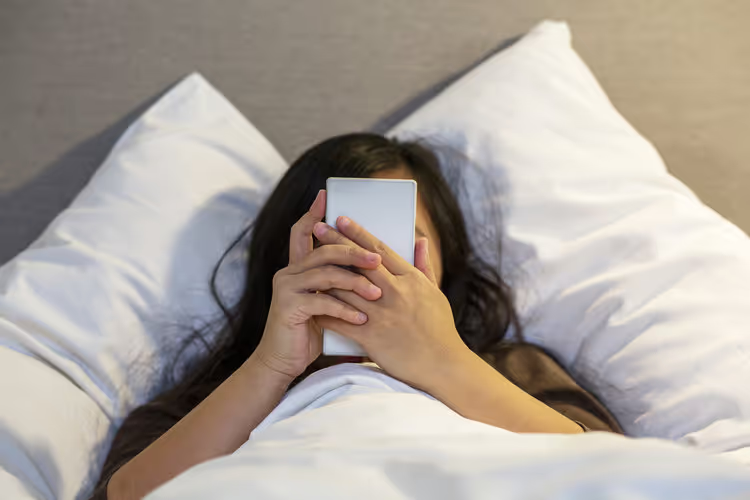


A new meta analysis published in Jama Pediatrics confirmed how portable devices like cellphones and tablets are seriously affecting our children's sleep. Sleep is one of the biggest pediatric public health issues of our time. I hear this firsthand when I ask groups in the post screening discussions "who sleeps with their cellphones their room?" Most hands in the room go up.
One of the conclusions and recommendations from this new Jama article is: "An integrated approach among teachers, health care professionals, and parents is required to minimize device access at bedtime." In other words, It takes a village to get all these screen habits changed and by talking about it regularly from all directions, change can happen.
PHOTO BY YIPENGGE/ISTOCK / GETTY IMAGES
Learn more about showing our movies in your school or community!
Join Screenagers filmmaker Delaney Ruston MD for our latest Podcast

Learn more about our Screen-Free Sleep campaign at the website!
Our movie made for parents and educators of younger kids
Learn more about showing our movies in your school or community!
Learn more about showing our movies in your school or community!
Join Screenagers filmmaker Delaney Ruston MD for our latest Podcast

Learn more about our Screen-Free Sleep campaign at the website!
Our movie made for parents and educators of younger kids
Join Screenagers filmmaker Delaney Ruston MD for our latest Podcast
As we’re about to celebrate 10 years of Screenagers, we want to hear what’s been most helpful and what you’d like to see next.
Please click here to share your thoughts with us in our community survey. It only takes 5–10 minutes, and everyone who completes it will be entered to win one of five $50 Amazon vouchers.
A new meta analysis published in Jama Pediatrics confirmed how portable devices like cellphones and tablets are seriously affecting our children's sleep. Sleep is one of the biggest pediatric public health issues of our time. I hear this firsthand when I ask groups in the post screening discussions "who sleeps with their cellphones their room?" Most hands in the room go up.
One of the conclusions and recommendations from this new Jama article is: "An integrated approach among teachers, health care professionals, and parents is required to minimize device access at bedtime." In other words, It takes a village to get all these screen habits changed and by talking about it regularly from all directions, change can happen.
PHOTO BY YIPENGGE/ISTOCK / GETTY IMAGES
Sign up here to receive the weekly Tech Talk Tuesdays newsletter from Screenagers filmmaker Delaney Ruston MD.
We respect your privacy.
A new meta analysis published in Jama Pediatrics confirmed how portable devices like cellphones and tablets are seriously affecting our children's sleep. Sleep is one of the biggest pediatric public health issues of our time. I hear this firsthand when I ask groups in the post screening discussions "who sleeps with their cellphones their room?" Most hands in the room go up.
One of the conclusions and recommendations from this new Jama article is: "An integrated approach among teachers, health care professionals, and parents is required to minimize device access at bedtime." In other words, It takes a village to get all these screen habits changed and by talking about it regularly from all directions, change can happen.
PHOTO BY YIPENGGE/ISTOCK / GETTY IMAGES


Catherine Price’s “Rebel's Code” focuses on intentional technology use and prioritizing real-world friendship, freedom, and fun. Her book The Amazing Generation, co-written with Jonathan Haidt, introduces these concepts to children through interactive formats and teen perspectives. Research indicates that when adolescents understand how platforms are designed to exploit attention, they show greater motivation to limit their social media use.
READ MORE >
Many adults keep their phones by the bed — it feels harmless, even necessary. But what if that habit is quietly affecting our sleep and the example we set for our kids? In this week’s blog, Dr. Ruston shares two key things every parent should know about sleeping next to a phone, and how small nighttime tech changes can make a big difference for the whole family.
READ MORE >for more like this, DR. DELANEY RUSTON'S NEW BOOK, PARENTING IN THE SCREEN AGE, IS THE DEFINITIVE GUIDE FOR TODAY’S PARENTS. WITH INSIGHTS ON SCREEN TIME FROM RESEARCHERS, INPUT FROM KIDS & TEENS, THIS BOOK IS PACKED WITH SOLUTIONS FOR HOW TO START AND SUSTAIN PRODUCTIVE FAMILY TALKS ABOUT TECHNOLOGY AND IT’S IMPACT ON OUR MENTAL WELLBEING.
